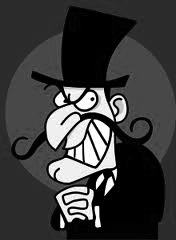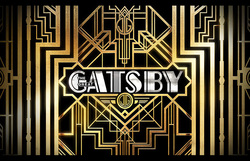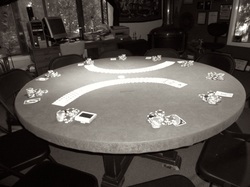
The antagonist is the character that opposes your protagonist because his agenda opposes your protagonist's agenda. He doesn’t even need to be all that bad, but to make an interesting story he must be as strongly motivated as your hero. He must be an equal match in terms of strength and resources as your protagonist. It’s even more interesting if your antagonist has a bit of an edge.
Think of your antagonist and protagonist as mirror images of one another: each blocking the other’s desire.
Consider Stanley Kowalski in Streetcar Named Desire. Blanche DuBois is our fragile protagonist and Stanley the brawling antagonist. They compete for Stella’s affections, loyalty, home and respect. It becomes a battle where only one can possibly succeed. Even though Stanley is rough and crude, we can’t help but see his view of Blanche and his right to be the head of his family.
Even if your antagonist is unsympathetic, so long as he has a powerful desire, the reader can’t help but sympathize. This desire becomes the reason behind why the antagonist commits his deeds. Understanding him gives him a spark of humanity.
And what if your antagonist truly is a villain? Well, that’s okay, too. Did you know that a recent study by Dr. David Buss revealed that 91% of men and 84% of women have fantasized about committing murder? How that informs fiction is that many of us readers are lured by the forbidden. Some of us daydream as we read books about “bad guys” and what it would be like not to be burdened by a moral code.
Go ahead, create a villain, just don’t make him a mustache-twirling-shifty-eyed sonofabitch. Your readers have seen that character ad nauseam. The villain must be psychologically complex. By having both a good and bad side, this antagonist can more fully test our hero.
What makes a good villain? The same qualities that make a good hero: larger-than-life strengths, highly motivated and operating at maximum capacity.
My favorite villains are Mr. Blond, Mr. Dark, Nurse Ratched, Evil Stepmother (Snow White), Hannibal Lecter and the Snow Queen. What do they have in common? Every one of them was stronger than the protagonist which upped the tension for me as I worried for the protagonist.
Who are your favorite villains?
Think of your antagonist and protagonist as mirror images of one another: each blocking the other’s desire.
Consider Stanley Kowalski in Streetcar Named Desire. Blanche DuBois is our fragile protagonist and Stanley the brawling antagonist. They compete for Stella’s affections, loyalty, home and respect. It becomes a battle where only one can possibly succeed. Even though Stanley is rough and crude, we can’t help but see his view of Blanche and his right to be the head of his family.
Even if your antagonist is unsympathetic, so long as he has a powerful desire, the reader can’t help but sympathize. This desire becomes the reason behind why the antagonist commits his deeds. Understanding him gives him a spark of humanity.
And what if your antagonist truly is a villain? Well, that’s okay, too. Did you know that a recent study by Dr. David Buss revealed that 91% of men and 84% of women have fantasized about committing murder? How that informs fiction is that many of us readers are lured by the forbidden. Some of us daydream as we read books about “bad guys” and what it would be like not to be burdened by a moral code.
Go ahead, create a villain, just don’t make him a mustache-twirling-shifty-eyed sonofabitch. Your readers have seen that character ad nauseam. The villain must be psychologically complex. By having both a good and bad side, this antagonist can more fully test our hero.
What makes a good villain? The same qualities that make a good hero: larger-than-life strengths, highly motivated and operating at maximum capacity.
My favorite villains are Mr. Blond, Mr. Dark, Nurse Ratched, Evil Stepmother (Snow White), Hannibal Lecter and the Snow Queen. What do they have in common? Every one of them was stronger than the protagonist which upped the tension for me as I worried for the protagonist.
Who are your favorite villains?


 RSS Feed
RSS Feed